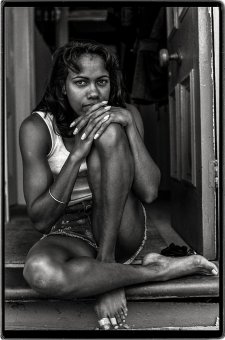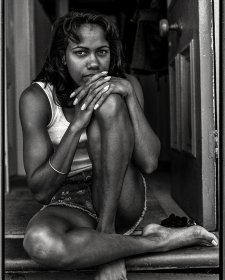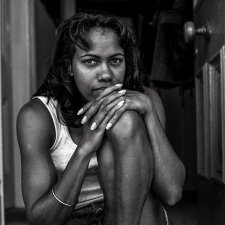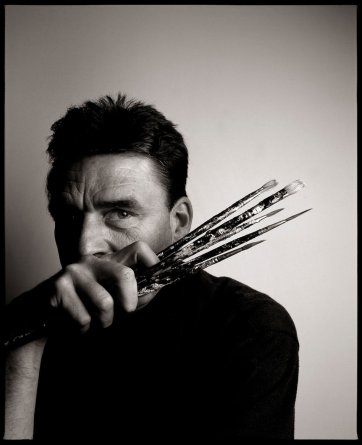Photographer Julian Kingma describes his style of quiet portraiture that captures the spaces in between big gestures.
- If I had my choice when it comes to taking portraiture, I'd rather have 45 minutes of conversation, and then jam in 15 minutes of image making because that conversation or getting to know someone lowers the temperature in the room, trust becomes a thing, then I start to conjure up ideas, and particularly if I'm in a panic 'cause I generally am in a state of panic of how I'm gonna make an interesting image. Originally, I was going to be an illustrator. So that was something that I always, always planned to do. I was never gonna do anything different, I was obsessed with illustration. So I went all through my high school years, went to art school, lasted one year in a fine art degree, and then the dark room was a side project as part of my degree, and then I got stuck into the dark room. And was just the magic of the dark room and all of a sudden, that laboriousness of illustration versus the instant gratification of photography, and it filled a big hole, filled an artistic hole, and I just went this is what I'm gonna do. And then just fortuitously there was a little tiny little ad in the newspaper before phones and it said cadetship, dark room assistant at the Herald Newspaper, and I went well, I'm just gonna make a folly out of work and I'm just gonna turn up and I'm just gonna apply for this job, and I got this job as a cadetship which is now known as an internship. And then yeah, just sort of grew from that. Yeah, so that's how the photography, like that part started. I'm such a curious person about people, and stories, and mannerisms. So before I even pick up a camera, I think I like having a conversation. That's really strange. I like hearing them talk and I watch them, and without realising, I think I'm observing those little, quiet nuances in between the big gestures, and that's the stuff that I tend to hone in on. I don't know why. I know it sounds a bit weird but it's sort of like this little trance-y moment where I go from the person walks in the room, does that, sits down, introduces themself, and then starts to relax, and then do things, and then I latch onto that, and then I hone that. It's like a dance but I try and lead the dance, I give and take. And then once they're really comfortable with me, then I start to talk about what we might do as an image, but I never go in with preconceived ideas, I know that. I'm bad if I come up with an idea and walk in 'cause it's not gonna work. I rely on what they do in front of me, and that is a cue for me. I describe my work as quiet, and I think that I look for those little, quiet gestures in between the bigger gestures like if someone's quite verbose and quite a loud talker because either that's who they are or they're insecure, I wait for that to calm down, and then I start to infiltrate my little bit, and then I hone in on that part of their personality. I try to yeah, I'll throw all that stuff aside and just put everything into that little moment, that little, tiny nuance, the quiet, little moment, which is what I love. Yeah, so that's what I'm hunting for and it is chance. It always ends up being chance. I shoot with my digital camera and the first thing that people say to me is don't you need to check the back of your screen? And I go no, 'cause it'll just throw me off my game. 'Cause if I see too much, I start to doubt myself. I think I just like living in that dream scape of I don't know what I'm gonna get, and that was the great thing about film, was you wind it on, I don't know, I think it was good? Pull the dark slide, it looked good. So I think I had that innate trust because I was lucky enough to have been trained in film and trust what was gonna come out at the other end, that you were gonna get something from those 36 frames at some point, you only need one really great shot. Whereas digital, 2000, 3000, I can't ever ... I shoot digital like I shoot film. I think people think I'm lazy and I shoot and I'm taking pictures of people digitally and I go all right, we're done, they go is that it? And I go well, was that disappointing? And I go I'm sorry if I disappointed you but I'm happy! So I still shoot digital like I'm shooting film, like it's the war and I've gotta ration it. But for me, that's where I love photography, that's where I love it. That's like watching the print come up.
Related people
Related information



In profile
Julian Kingma
Magazine article by Penelope Grist, 2023Penelope Grist explores the photographic instinct of four-time National Photographic Portrait Prize finalist Julian Kingma.



The Gallery
Visit us, learn with us, support us or work with us! Here’s a range of information about planning your visit, our history and more!



Support your Portrait Gallery
We depend on your support to keep creating our programs, exhibitions, publications and building the amazing portrait collection!






